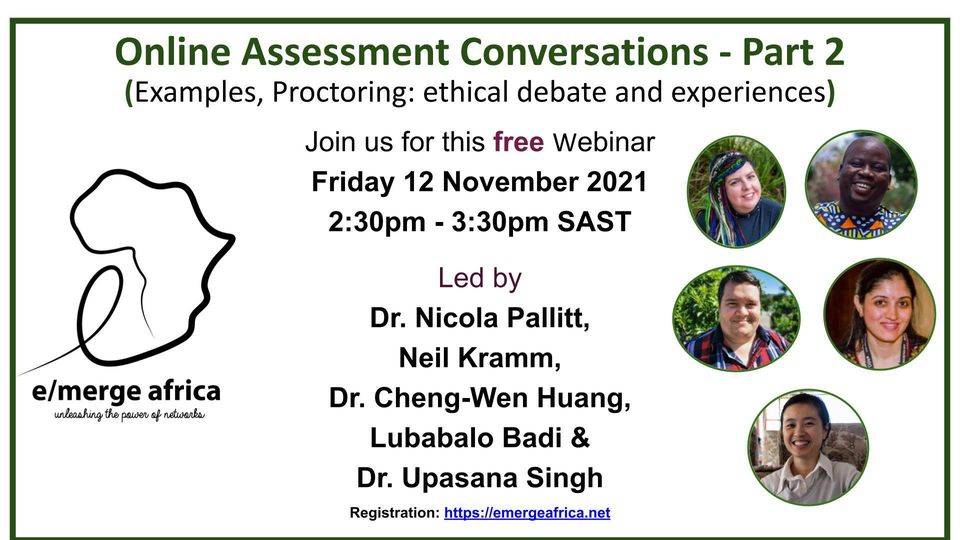
Session Type: Webinar (1 hour)
Date: Friday, 12 November 2021; 14:30 – 15:30 SAST
Description of webinar:
One of the challenges of online assessment is maintaining the integrity of the assessment. Universities which moved to online teaching and learning during the pandemic are increasingly turning to online proctoring technologies which require students to confirm their identity and accept some degree of virtual monitoring. Critics of online proctoring regard this approach as unjustified surveillance.
We will consider:
1) The ethical debates surrounding online exam proctoring
2) Experiences of introducing online proctoring
3) Experiences of introducing online invigilation of exams
We will keep to the same conversational style as used for Online Assessment Conversations – Part 1. There will be opportunities for questions and other contributions by participants in this event.
To join this event please sign up via Zoom
Panellist Bios
Our Panel:

Lubabalo Badi, joined the Learning Technologies Team as a Consultant in the Centre for Innovation in Learning and Teaching (CILT), Univerisity of Cape Town, June 2010. Prior to this, he worked as an ICT Staff Training Facilitator at the University of the Western Cape (UWC) from which he holds a BCom & BCom (Hons) in Information Systems. After joining CILT, he was exposed to a variety of Learning Technologies, and over time developed a keen interest in the use of Educational Technologies, and he believes that a lot can be achieved using ICTs in teaching & learning for both. He is currently completing a mini dissertation, focusing on the Academics experiences of and approaches to teaching with Lecture Capture across different disciplines.

Dr Cheng-Wen Huang is a Senior Lecturer based in the Academic Staff Development team, Centre for Innovation in Learning and Teaching, University of Cape Town. She is currently working on the University Capacity Development Grant (UCDG) Project 10: Enabling Student Success Through Transformed Programmes of Assessment and a sub-project of the Learning Platforms Update Project (LPUP) on course evaluations. She has previously worked on the Cases on Open Learning (2020) project and the Commonwealth Digital Education Leadership in Training in Action (2016) project. Cheng-Wen has a research background in multimodal social semiotics, argumentation, academic literacies, digital literacies, open learning, assessment and social justice.

Dr Upasana Gitanjali Singh, University of KwaZulu Natal South Africa, is an experienced Lecturer with a demonstrated history of working in the higher education industry. Her passion is international collaboration and networking, hence she has successfully organised and hosted 5 international conferences in Durban and Mauritius since 2016. 7 MoUs for UKZN, with International HEIs, have been championed by her since 2016. She has delivered 8 keynote speeches at International conferences since 2016 and visited 8 international HEIs as a guest speaker for IT, Engineering and WIE related events. 2 successful WIE events have been arranged by her since 2018, where over 350 female learners were motivated to adopt STEM careers, by a high calibre local and international speakers. With a particular interest in Digital Teaching and Learning she has empowered over 154 UKZN academics in the adoption of tools available in Moodle to support Teaching, Learning and Assessment since 2018; as well as conducted 4 workshops related to Technology in Education, since 2015.
Neil Kramm is based at the Educational Technology Unit in the Centre for Higher Education Research,Teaching and Learning (CHERTL) at Rhodes University. Neil is passionate about academic development and infusing technology into teaching and learning. He enjoys working with innovative technology solutions and implementing tech solutions that enhance teaching and learning. He is an active researcher on issues relating to educational technology, in particular, how technology is incorporated into teaching and learning.
Dr. Nicola Palitt coordinates the efforts of the Educational Technology Unit in the Centre for Higher Education Research,Teaching and Learning (CHERTL) at Rhodes University and offers professional development opportunities for academics to use technologies effectively in their roles as educators and researchers. Nicola supervises postgraduate students and co-teaches on formal courses in Higher Education. She enjoys meeting EdTech practitioners and researchers from across the globe.
